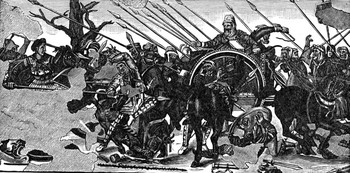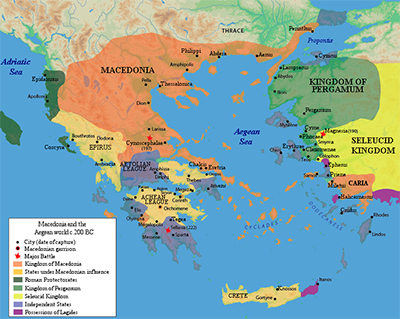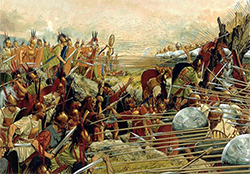Ancient Macedon
Part 2: Alexander and Beyond  Alexander embarked on a historic campaign, defeating the mighty Persian Empire and absorbing it as he marched ever eastward, reaching the depths of India before listening to his army's pleas to return home. Along the way, he won battle after battle, defeating the larger Persian armies again and again–at Granicus, Issus, and Gaugamela. The victorious Macedonians and Greeks occupied existing cities and seized their spoils. Alexander, obsessed with ruling the world, urged them ever onward. In his travels from Macedonia to India, Alexander founded many cities, several named Alexandria. Most cities were placed on trade routes, so as to increase the flow of goods between East and West. The greatest of these cities, in Egypt, housed a great library for centuries. All of these cities were Greek-styled cities in non-Greek territory, cities in territories that had no real cities. Persian goods traveled to Athens, just as Greek goods traveled to Babylon. Goods and customs mingled, as did soldiers and traders. A common currency and common language (Greek) united the many peoples of the empire. All religions were tolerated. People who had been enemies for centuries were brought together under a giant umbrella of what historians call Hellenization&emdash;the spreading of Greek ideals, thought, and culture to the Middle East and Asia. Alexander also brought the East back to Greece. A student of Aristotle, Alexander had with him botanists, scientists, and philosophers, all of whom studied and cataloged the plants, science, and philosophy of the people they conquered. These observations found their way back to Aristotle, and Greek knowledge of the East increased. Alexander died in Babylon in 323 B.C. His death brought on a period of great uncertainty and divided loyalties. His half-brother reigned as King Philip III Arrhidaeus; at the same time, Alexander's son claimed sovereignty as Alexander IV; both were assassinated. A number of Alexander's generals divided the spoils of the empire and became known as the Diadochi. Ptolemy I ruled in Egypt. Other kingdoms included those of Cassander, Epirus, Lysimachus, and Seleucus. Also in the fray was Perdiccas, whom Alexander had seemingly named as regent by handing him his signet ring just before he died. 
A number of civil wars, assassinations, and political machinations followed, with Macedon losing more and more of its Greek territory as internecine conflict consumed it. King Antigonus III in 222 B.C. defeated Sparta at the Battle of Sellasia and occupied the famed military powerhouse city-state for the first time in its history. When Antigonus III died the following year, his son and successor, Philip V, inherited a kingdom that was strong again. Philip set about conquering Illyria and signing a treaty with the Carthaginian leader Hannibal during the Second Punic War. A handful of Greek lands rose up against Philip V, and the result was a handful of battles and then a peace treaty. During that war, Philip's forces had been fighting against Greek foes who had been encouraged to revolt by the relatively new power of Rome. This republic engaged Macedonian forces fully beginning in 200 B.C. Two years into the conflict, Philip was forced to flee his realm; a year later, Roman forces won the Battle of Cynoscephalae and Philip sued for peace. 
Philip enjoyed the nominal alliance with Rome by attacking a handful of city-states in central Greece. When Philip V died, in 179 B.C., his son Perseus set about trying to solidify his hold on power. An alliance with the Boeotian League gave him breathing room, but he eventually fell afoul of Rome, triggering yet another war with the powerful Italian republic. Roman forces defeated Macedonian forces at the Battle of Pydna in 168 B.C. This was the end of the Macedonian monarchy, the victorious Romans abolishing it the following year and setting up a number of republics in its place. When Rome defeated Carthage for the third and final time, in 146 B.C., Macedon finally and fully became a Roman province. First page > Beginnings and Conquests > Page 1, 2
|
|
Social Studies for Kids
copyright 2002–2026
David White




